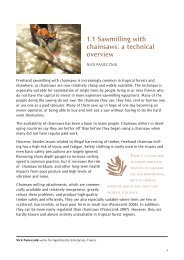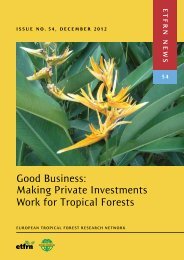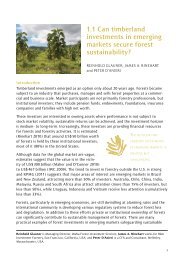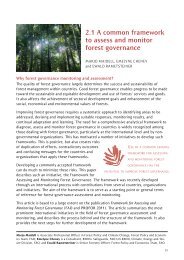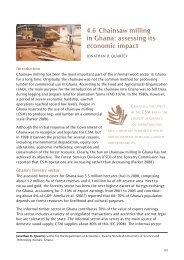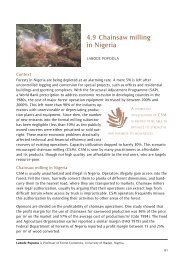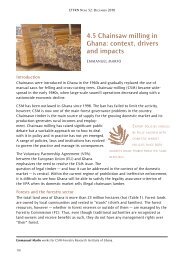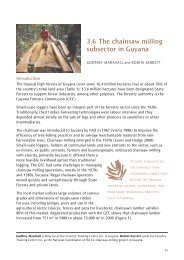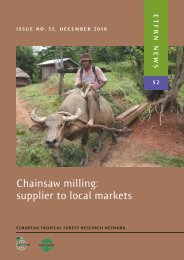Chainsaw milling: supplier to local markets - European Tropical ...
Chainsaw milling: supplier to local markets - European Tropical ...
Chainsaw milling: supplier to local markets - European Tropical ...
Create successful ePaper yourself
Turn your PDF publications into a flip-book with our unique Google optimized e-Paper software.
62<br />
ETFRN NEws 52: DEcEmbER 2010<br />
ments. Few rural dwellers have access <strong>to</strong> financing and no credit facilities have been set<br />
up <strong>to</strong> enable forest owners <strong>to</strong> invest in forest management. Consequently, although a wide<br />
range of forest users have been granted commercial forest user rights, most of them do<br />
not have the financial means <strong>to</strong> engage in commercial logging without capital investment<br />
from nGos or private funders.<br />
New participants in the timber business<br />
a considerable number of forest users — including farmers and indigenous communities,<br />
asls and private forest owners — have benefitted from the new forest law (benneker<br />
2008). by 2006, 100 forest management plans of indigenous and farmers communities had<br />
been approved covering 1.1 million hectares (ha) of forest.<br />
Farmers and indigenous communities<br />
Farmers and indigenous communities who had a connection with an nGo and who owned<br />
a reasonably large and accessible forest started receiving financial and technical assistance<br />
<strong>to</strong> develop and/or implement a forest management plan. by now, many of these<br />
communities have consolidated their forest management activities and operate independently.<br />
most communities outsource the construction of roads and the extraction of logs<br />
<strong>to</strong> private enterprises that are often also the buyers of the timber. Timber sales contracts<br />
are generally signed for one year and are thus flexible. Timber prices and secondary contract<br />
conditions have improved considerably over time, and the communities have more<br />
negotiation capacity. The communities are responsible for yearly inven<strong>to</strong>ries, the elaboration<br />
of logging plans and reports and for felling and limbing trees. Due <strong>to</strong> a lack of capital<br />
for extraction equipment, the communities are limited in the forest management activities<br />
they can implement themselves.<br />
Other communities<br />
a second group of communities received financial assistance from private enterprises.<br />
These communities are generally located in less accessible forest areas and own forests<br />
with high-value timber species. unlike the financial and technical assistance offered by<br />
nGos, the funds provided by private enterprises pay communities for the management<br />
plan and take care of all management and logging activities, without much participation<br />
by community members. These logging companies have de fac<strong>to</strong> control over community<br />
forest areas, as if they were concessions. Communities are rarely informed about the timber<br />
volumes harvested and are commonly cheated in prices and payments. They are often<br />
locked in long-term timber sales contracts that are difficult <strong>to</strong> renegotiate.<br />
by 2006, the management plans of 23 asls, covering 600,000 ha of forest, had been approved.<br />
These former illegal loggers have been partly successful in organizing themselves<br />
and requesting forest concessions from the municipalities. Their development has been<br />
easier in accessible forest areas, as extraction costs are lower and the market is familiar.<br />
For most asls, the legal procedures <strong>to</strong> get legally established and awarded a concession<br />
have been tedious, costly and virtually impossible without external assistance. asls have



